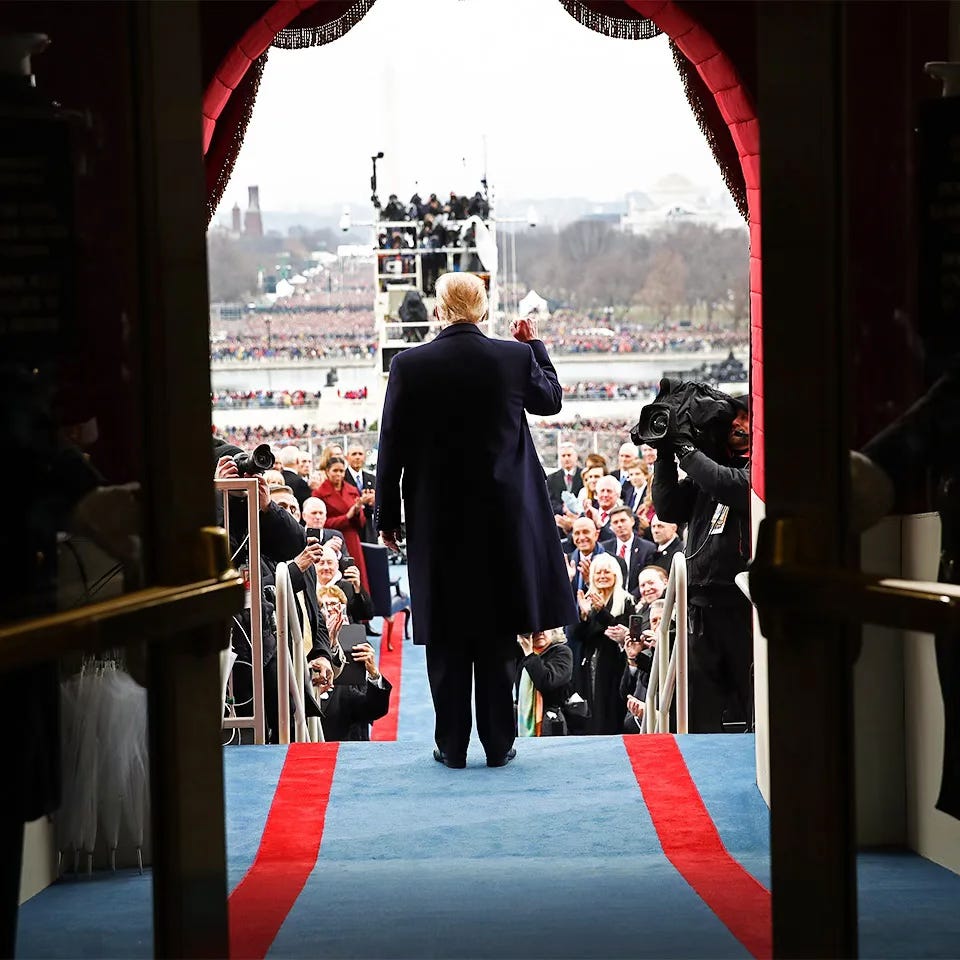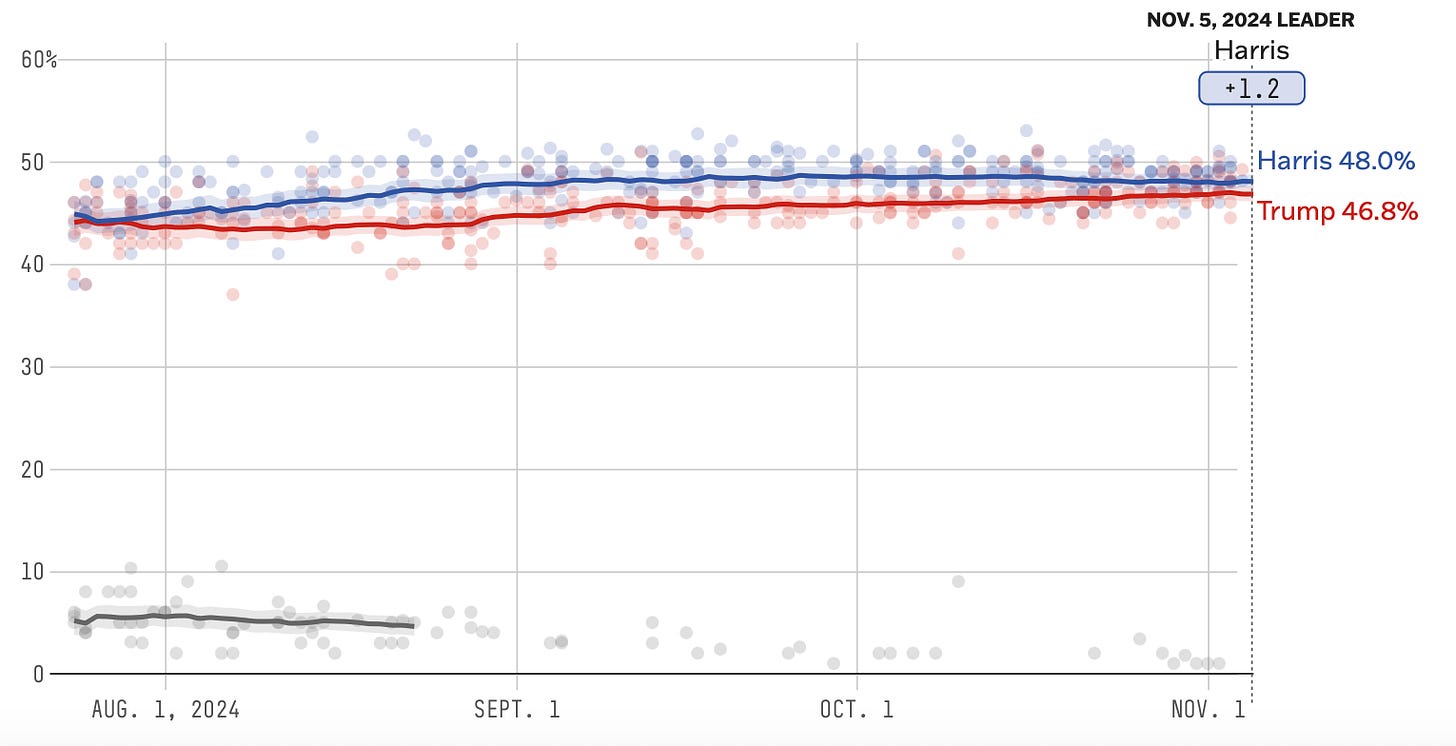The events of this week are basically the final events of the book I’m working on about the modern Republican Party. There are a lot of starting points for this history, but probably the most central one is January 6, 2021. Before a few years ago, if you’d said that the person who lost his reelection bid and then launched a violent but unsuccessful insurrection effort to remain in power would be nominated and elected legitimately four years later, you’d be laughed out of the room. Or at the very least, they’d say you were describing a place other than the United States. How did we get here?
There’s a certain tendency I’ve seen by a lot of political observers to think that there was One Neat Trick that would have kept Donald Trump from returning to office. If Nancy Pelosi had started the 2021 impeachment the night of January 6th, if Mitch McConnell had voted to convict, if Merrick Garland had appointed a special counsel immediately upon taking office, if Ron DeSantis had been a stronger primary opponent or worn better boots, if rival candidates had been more willing to call out Trump’s criminal behavior, if Joe Biden had stepped down earlier, if Kamala Harris had talked more about the working class or had been a white guy, etc etc etc.
I don’t buy it. As I wrote shortly after the 2020 election, I thought Trump would remain the functional leader of the Republican Party for the foreseeable future, largely because the party sees him as the key to the white working class voters they’re desperate not to lose, and because he can end their careers.
We had a test of this fairly early on. According to ABC News reporter Jonathan Karl, on the day he left office in 2021, Donald Trump told then-RNC chair Ronna McDaniel that he was abandoning the Republican Party and forming his own party. He was angry that the party, to his mind, had not sufficiently stood up for him during his efforts to overturn the 2020 election results. The conversation went:
“I’m done,” Trump told McDaniel. “I’m starting my own party.”
“You cannot do that,” McDaniel told Trump. “If you do, we will lose forever.”
“Exactly. You lose forever without me,” Trump responded. “I don’t care.”
Trump ended up staying in the party because the RNC played hardball with him. They told him they would stop paying for the legal expenses associated with his 2020 election lawsuits, and that they would take away the campaign supporter e-mail list that he had been renting to other candidates at considerable fees. That is, the party threatened to cut him off both from his supporters and from a cash cow. Trump relented and remained in the party.
To me, this is an important signal that the party was never seriously going to turn against him. Even in early 2021, when he was arguably at his weakest and least popular, and relatively silent thanks to his ban from most social media sites, they understood the hold he had on the most active Republican voters. They knew he had the power to destroy the party or end the careers of anyone who turned against him.
We got further useful evidence in 2023 when several Republicans ran for president against Trump without running against Trump. They were attempting a largely untried and unsuccessful strategy of running for office without attacking the frontrunner. The only candidates to directly criticize Trump — Chris Christie, Asa Hutchinson, and Mike Pence — had support indistinguishable from zero among Republican voters and their campaigns didn’t make it past the Iowa caucuses. Tellingly, in the first Republican candidates’ debate in 2023, when asked if they would support Trump as the nominee even if he were a convicted felon, six of the eight candidates on stage said yes.
For these and other reasons, I’m extremely skeptical of all the moments when Trump’s return could have been derailed. What if the 2021 impeachment had been held on January 6th, when members of Congress were still freaked out from being hunted by a mob just hours earlier? Would there have been enough Republican Senators to vote guilty and bar him from office? Keep in mind that roughly half of the Republican House conference voted against accepting Biden’s vote count in Arizona and Pennsylvania that night. The process that occurred over the next few days to get Republican officeholders to close ranks behind Trump likely would have just happened more quickly if the Senate impeachment trial had come sooner.
Should Merrick Garland have moved more quickly? Unquestionably. Would an earlier conviction of Trump on federal charges have derailed his presidential nomination? Doubtful. Recall that Trump was officially nominated at the Republican convention seven weeks after being convicted on 34 felony counts in New York, without any apparent loss of support. Indictments across 2023 only seemed to strengthen his candidacy among Republican primary voters, regardless of the merits of each case. Even if the federal prosecution about the 2020 election had managed to convict Trump before 2024, I think it’s reasonably likely Republican voters would still have voted for him, and that’s probably true even if he were serving time in a federal penitentiary at that point. Was there any moment between 2021 and today when legal difficulties actually hurt Trump in the eyes of Republican voters?
Okay, what about if Joe Biden had dropped out earlier, giving Kamala Harris more time to build rapport among voters, or possibly even allowing for a Democratic primary of some sort? It’s hard to know what would have happened, but my guess is that the sitting vice president still becomes the nominee. Does she do better? I doubt it. Remember, Harris’ support roughly peaked in early October. It’s possible that a longer campaign just erodes her support more. And when it came to the general election, Trump was a beneficiary of the same anti-incumbent trend that benefited challengers in democracies around the world in 2024.
We can construct all sorts of counterfactuals in our heads, but none of them change two very basic facts about modern Republican politics:
Republican voters largely love Donald Trump. Not all of them, to be sure, but enough of them like what he stands for, like who he has chosen for his enemies, and look back with fondness on his first term.
Republican officeholders are largely terrified of Donald Trump. They know that if they cross him too much, he can end their career in a primary election, and his supporters can also threaten them and their families.
Finally, there’s the basic phenomenon that Republicans just do not prioritize electability the way Democrats do. Worries that Trump might not win in 2024 simply didn’t seem important to most of them, in part because pundits have often underestimated the chances for other “unelectable” politicians in the past.
This is why we’re back here. I’m hesitant to call any outcome “inevitable,” but the Republican Party has been riding this particular train for quite a few years now and has demonstrated roughly zero interest in getting off.








I totally agree SM, especially because of the recent global trend of unhorsing (or weakening) of incumbent governments. All the other factors that you cite also matter, including the complete capture of the GOP, which, to survive, needs the base that Trump owns.
I am impressed by all the "insider info" in this piece. I came to similar conclusions about the likely result of earlier convictions based on the aftermath of Hitler's Beer Hall Putsch, and just assumed that jail time would have only added to Trump's (constantly begged for) martyr creds. But I had no idea of the inner workings of the upper GOP echelon and their interrelations with Trump's interests: much of the material here didn't even make it onto Joy Reid or Rachel Maddow.
Based on this writing, I think I will like your forthcoming book. But of course I could be wrong--to find out for sure, have your pub send me a copy, and, if it seems like it's in my wheelhouse, I will review it for 3:16 AM Magazine here: https://www.3-16am.co.uk/articles/.c/a-hornbook-of-democracy-book-reviews